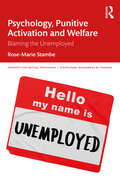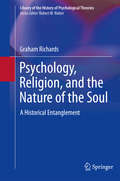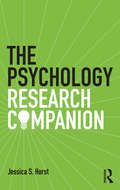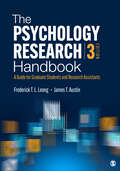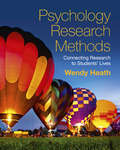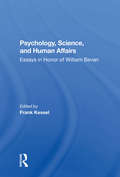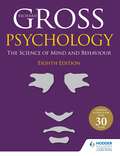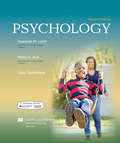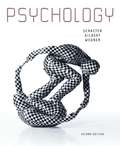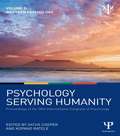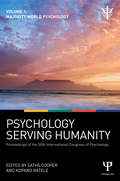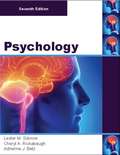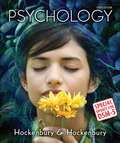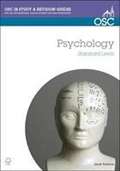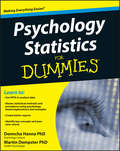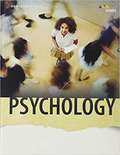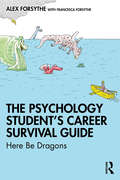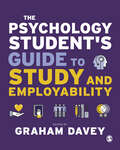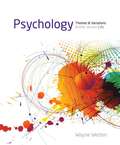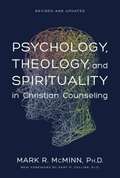- Table View
- List View
Psychology, Punitive Activation and Welfare: Blaming the Unemployed (Concepts for Critical Psychology)
by Rose-Marie StambeThis book explores welfare politics, unemployment, and interventions in relation to the labour market from a critical psychological perspective. Using critical fieldwork and theory, the author explores the administration of the unemployed, and the drive to increase labour market participation through strategies of activation. There is a strong and coherent conceptual and theoretical framing for this work, with a critical perspective (essentially, question everything) taking centre stage. It will give an overall coherence in addressing the topic. The theoretical framing is cogent and, in combination with the critical perspective, works well for integrating the material and delivering a fresh approach to this topic. Psychology, Punitive Activation and Welfare will appeal to students engaging with critical psychology, unemployment or policy, by providing a distinct application of theoretical and methodological tools to think differently about the relationship between labour market non/participation, human misery, psychology, and frontline enactment of policy and research.
Psychology, Religion, and the Nature of the Soul
by Graham RichardsNeither a book about the psychology of spirituality nor America's ongoing turf wars between religion and science, Psychology, Religion, and the Nature of the Soul takes to task many of the presumed relationships between the two--from sharing common concerns to diametrically hostile opposites--to analyze the myriad functions religion and psychology play in our understanding of the human life and mind. Graham Richards takes the historical and philosophical long view in these rigorous and readable essays, which trace three long-running and potentially outmoded threads: that psychology and religion are irrelevant to each other, that they are complementary and should collaborate, and that one will eventually replace the other. He references a stunning variety of texts (from Freud and Allport to Karen Armstrong and Paul Tillich) reflecting the evolution of these ideas over the decades, to emphasize both the complexity of the issues and the enduring lack of easy answers. The eloquence of the writing and passionate objectivity of the argument will interest readers on all sides of the debate as the author examines: the religious origins of psychology, the original dichotomy: mythos versus logos, the authenticity of religious experience, Religion and personality, the problematic role of prayer and Religion in the history of psychotherapy. For those making a serious study of the history of psychology, Psychology, Religion, and the Nature of the Soul will inspire a fresh wave of critical discussion and inquiry.
The Psychology Research Companion: From student project to working life
by Jessica S. HorstThe Psychology Research Companion: From student project to working life not only gives you the skills and confidence to conduct your psychology research project at university, but is the first book to show how these skills will help you get ahead in your first job in the workplace. Jessica S. Horst, an American psychologist teaching in the UK, takes you through every step of the research process; from conceiving your research question and choosing a research methodology, to organizing your time and resources effectively. The book includes sections on ethics, data management, working with research participants and report writing, but each chapter is also informed by the wider aim of providing a toolkit for working life. Each chapter is packed with tips and skills that can be taken into the workplace, including working collaboratively and organising your workload, as well as discussing your research project in interview situations and when applying for jobs. This invaluable guide will appeal to all undergraduate and postgraduate psychology students whose aim is to learn a set of transferable research skills as well as to obtain a good degree result.
The Psychology Research Handbook: A Guide for Graduate Students and Research Assistants
by Frederick T. L. Leong James T. AustinIn the Third Edition of The Psychology Research Handbook editors Frederick T. L. Leong and James T. Austin have assembled experienced expert researchers to provide graduate students and research assistants with a comprehensive framework for conducting many types of psychology research. The book is organized around the idea of a "research script," following the step-by-step process of research planning, design, data collection, analysis, and disseminating research. Many chapters are coauthored by advanced graduate students to give their fellow students a sense of real-world research, adding to the clarity and practicality of many chapters. Students and instructors alike will appreciate chapters on topics typically missing from introductory methods texts, including applying for research grants, dealing with journal editors and reviewers, working within research teams, and conducting cross-cultural research. Structures such as recommended readings and exercises guide students to develop and expand their research skills. New chapters include Power and Evidence, IRB as Critical Collaborators in Research, Alternative Data Collection Strategies, Structural Equation Modeling and Replicability and Reproducibility. A comprehensive, easy-to-understand guide to the entire research process, this book quickly and efficiently equips advanced students and research assistants to conduct a full research project.
The Psychology Research Handbook: A Guide for Graduate Students and Research Assistants
by Frederick T. L. Leong James T. AustinIn the Third Edition of The Psychology Research Handbook editors Frederick T. L. Leong and James T. Austin have assembled experienced expert researchers to provide graduate students and research assistants with a comprehensive framework for conducting many types of psychology research. The book is organized around the idea of a "research script," following the step-by-step process of research planning, design, data collection, analysis, and disseminating research. Many chapters are coauthored by advanced graduate students to give their fellow students a sense of real-world research, adding to the clarity and practicality of many chapters. Students and instructors alike will appreciate chapters on topics typically missing from introductory methods texts, including applying for research grants, dealing with journal editors and reviewers, working within research teams, and conducting cross-cultural research. Structures such as recommended readings and exercises guide students to develop and expand their research skills. New chapters include Power and Evidence, IRB as Critical Collaborators in Research, Alternative Data Collection Strategies, Structural Equation Modeling and Replicability and Reproducibility. A comprehensive, easy-to-understand guide to the entire research process, this book quickly and efficiently equips advanced students and research assistants to conduct a full research project.
Psychology Research Methods: Connecting Research to Students' Lives
by Wendy HeathComprehensive, engaging, and punctuated with humor, this undergraduate textbook provides an interesting introduction to research methodology. <P><P>Psychology Research Methods allows students to become familiar with the material through examples of research relevant to their lives. The textbook covers every major research approach in psychology. Students will learn how to evaluate and conduct the different varieties of descriptive research and experimental research. They will learn all steps of the research process from developing a research idea to writing about and presenting what they did. Each chapter contains suggestions for journal article readings and activities relevant to the topics covered. <P>The textbook also includes a chapter on how to conduct research online and an appendix with an annotated manuscript keyed to the current edition of the American Psychological Association Publication Manual.
Psychology, Science, And Human Affairs: Essays In Honor Of William Bevan
by Frank Kessel Norman Garmezy Richard Trumbull Michael SokalThese original essays, written by prominent scholars, pay tribute to the work of William Bevan. In the course of his distinguished career, Bevan has exhibited an almost unique capacity to focus a clear-eyed, critical gaze on operating assumptions and actions—his own and those of others—and to initiate consequential, constructive steps forward, both
Psychology: The Science of Mind and Behaviour 8th Edition
by Richard GrossBuild a solid foundation for students to develop the skills and knowledge they need to progress with the updated edition of Richard Gross's best-selling introduction to Psychology.This 8th edition of Psychology: The Science of Mind and Behaviour is the essential guide to studying Psychology, helping over half a million students during its 30 years of publication.- Easily access psychological theories and research with user-friendly content and useful features including summaries, critical discussion and research updates.- Develop evaluative skills, with new evaluation boxes, encouraging students to put classic and contemporary studies into context.- Consolidate understanding by identifying common misconceptions.- Stay up to date with revised content and the latest psychological research.- Understand the research process with updated contributions from leading Psychologists including Elizabeth Loftus, Alex Haslam and David Canter.
Psychology: The Science of Mind and Behaviour 8th Edition
by Richard GrossBuild a solid foundation for students to develop the skills and knowledge they need to progress with the updated edition of Richard Gross's best-selling introduction to Psychology.This 8th edition of Psychology: The Science of Mind and Behaviour is the essential guide to studying Psychology, helping over half a million students during its 30 years of publication.- Easily access psychological theories and research with user-friendly content and useful features including summaries, critical discussion and research updates.- Develop evaluative skills, with new evaluation boxes, encouraging students to put classic and contemporary studies into context.- Consolidate understanding by identifying common misconceptions.- Stay up to date with revised content and the latest psychological research.- Understand the research process with updated contributions from leading Psychologists including Elizabeth Loftus, Alex Haslam and David Canter.
Psychology (Second Edition)
by Deborah M. Licht Misty G. HullThoroughly revised with input and insight from many of the hundreds of adopters of the groundbreaking first edition, Scientific American: Psychology continues to set a new standard for the introduction to psychology. Deborah Licht and Misty Hull continue to combine their years of research and teaching insights with the journalistic skill of science writer Coco Ballantyne. Together, they have created an introductory psychology resource that combines print and digital components into a seamless learning experience. The project draws on written profiles and video interviews of 27 real people to help students better understand, remember, and relate to psychology’s basic ideas. Beautifully designed, the printed text is filled with high-interest examples and features, including full-page infographics that help students understand and retain key concepts. Online, additional author-created resources, including scaffolded activities and adaptive quizzes, provide a seamless learning experience for students and a reliable assessment mechanism for instructors and programs. This innovative collaboration between Worth Publishers and Scientific American reflects a commitment to engaging and educating all students, including those who sometimes seem difficult to engage—in the contemporary style of the world’s most respected science magazine.
Psychology (Second Edition)
by Daniel L. Schacter Daniel T. Gilbert Daniel M. WegnerThoroughly revised and updated, the second edition of this popular introductory psychology textbook introduces effective new teaching techniques as well as a range of new topics. Clear and engaging, the book provides a fundamental insight into how the mind works.
Psychology Serving Humanity: Volume 2: Western Psychology
by Saths Cooper Kopano RateleThis is the second of two volumes collecting the key proceedings of the 30th International Congress of Psychology, the first to be held in Africa in the 123 years of its history. The theme of the conference was "Psychology Serving Humanity", a recognition of psychology's unfulfilled mission in the majority world and a reflection of what that world requires from psychology. Mainstream Psychology finds its largest number of exponents and leading personalities in the high income countries of the global West. The Other Psychologies, referred to by different names, are scattered across the rest of the world. Some of the names of these other forms of Psychology include indigenous Psychology. The main driver of indigenous and other forms of non-mainstream Psychology is the endeavour to embed the discipline in the dynamics of local societies. Psychology has entered an interesting era, however. While the dominant philosophy underpinning the discipline remains Western, Psychology in the majority world in 2000s may have reached a tipping point. It took over a hundred years but the 2004 and 2012 International Congresses of Psychology held in China and South Africa heralded a newfound possibility for the discipline. There is an opening of the field to potentially new thought and forms of the practice of Psychology. These proceedings are published in the hope that all psychologists, especially those located in well-resourced institutions in the West, confront the divided reality that characterizes Psychology so as to creatively consider the opportunity opened up by the growing field at the peripheries. Care was taken when assembling both conference and proceedings to ensure that the entire international psychological community was represented. Volume One contains contributions to Majority World Psychology. Volume Two contains contributions to Western Psychology.
Psychology Serving Humanity: Volume 1: Majority World Psychology
by Saths Cooper Kopano RateleThis is the first of two volumes collecting the key proceedings of the 30th International Congress of Psychology, the first to be held in Africa in the 123 years of its history. The theme of the conference was "Psychology Serving Humanity", a recognition of psychology's unfulfilled mission in the majority world and a reflection of what that world requires from psychology. Mainstream Psychology finds its largest number of exponents and leading personalities in the high income countries of the global West. The Other Psychologies, referred to by different names, are scattered across the rest of the world. Some of the names of these other forms of Psychology include indigenous Psychology. The main driver of indigenous and other forms of non-mainstream Psychology is the endeavour to embed the discipline in the dynamics of local societies. Psychology has entered an interesting era, however. While the dominant philosophy underpinning the discipline remains Western, Psychology in the majority world in 2000s may have reached a tipping point. It took over a hundred years but the 2004 and 2012 International Congresses of Psychology held in China and South Africa heralded a newfound possibility for the discipline. There is an opening of the field to potentially new thought and forms of the practice of Psychology. These proceedings are published in the hope that all psychologists, especially those located in well-resourced institutions in the West, confront the divided reality that characterizes Psychology so as to creatively consider the opportunity opened up by the growing field at the peripheries. Care was taken when assembling both conference and proceedings to ensure that the entire international psychological community was represented. Volume One contains contributions to Majority World Psychology. Volume Two contains contributions to Western Psychology.
Psychology (Seventh Edition)
by Sandra E. Hockenbury Susan A. Nolan Don H. HockenburyThis acclaimed classroom favorite makes the science of psychology (and through that, the process of science itself) come alive for students, with personal stories that exemplify important concepts in a student-friendly way, and with coverage of the field's scientific foundations and advances that is accessible without being oversimplified. <P><P>The substantially updated new edition extends the book's focus on developing scientific literacy in the context of psychology, with new features in print and in the book's new online course space, LaunchPad. These features are the result of the book's most dramatic addition: Sandra Hockenbury's new writing partnership with co-author, Susan Nolan, who shares her belief that the introductory course can help all kinds of students develop a real understanding of psychology and lasting scientific literacy without sacrificing the field's research core.
Psychology (Seventh Edition)
by Lester M. Sdorow Cheryl A. Rickabaugh Adrienne J. Betz<p>If you have not adopted this book in the past, we believe that you will find that your students will be eager to read it and to learn from it. You will find that the book achieves interest and readability while also accomplishing the following goals: <p> <li>Portraying psychology as a science <li>Demonstrating the superiority of science over common sense <li>Showing that psychological research occurs in a sociocultural context <li>Illustrating the relevance of psychology to everyday life <li>Encouraging critical thinking in all aspects of life, particularly in regard to the media <li>Placing psychology in its intellectual, historical, biographical, and sociocultural contexts</li> </p>
Psychology (Sixth Edition)
by Don H. Hockenbury Sandra E. HockenburyWelcome to psychology! Our names are Don and Sandy Hockenbury, and we're the authors of your textbook. Every semester we teach several sections of introductory psychology. We wrote this text to help you succeed in the class you are taking. Every aspect of this book has been carefully designed to help you get the most out of your introductory psychology course. Before you begin reading, you will find it well worth your time to take a few minutes to familiarize yourself with the special features and learning aids in this book.
Psychology Standard Level
by Jacob SolomonPsychology Standard Level This book is designed specifically to help you to review the material of the course. The word revision literally means to see again. By presenting the material in brief, review form, you should get the overall feel and perspective of how the topics you have studied come together. That includes their perspectives, wide variety of methods used, and how the ideas and findings relate to one another. In short, you should see the wood, despite the trees.
Psychology Statistics For Dummies
by Donncha Hanna Martin DempsterThe introduction to statistics that psychology students can't afford to be withoutUnderstanding statistics is a requirement for obtaining and making the most of a degree in psychology, a fact of life that often takes first year psychology students by surprise. Filled with jargon-free explanations and real-life examples, Psychology Statistics For Dummies makes the often-confusing world of statistics a lot less baffling, and provides you with the step-by-step instructions necessary for carrying out data analysis.Psychology Statistics For Dummies:Serves as an easily accessible supplement to doorstop-sized psychology textbooksProvides psychology students with psychology-specific statistics instructionIncludes clear explanations and instruction on performing statistical analysisTeaches students how to analyze their data with SPSS, the most widely used statistical packages among students
The Psychology Student’s Career Survival Guide: Here Be Dragons
by Alex ForsytheThe Psychology Student’s Career Survival Guide is designed to aid students in identifying their ideal career pathway and imbue them with the right tools and skills to not only achieve their desired job but to progress and thrive within the workplace. The first half of the book focuses on how to find and get a suitable job. The remaining chapters explore gaining success in the workplace in terms of personal growth, navigating criticism, workplace relations and the critical job assignments that every graduate should pursue. Forsythe, an experienced organisational psychologist, helps students recognise and apply the acquired psychological skill set to develop a personal brand, increase personal visibility and develop professional networks. This smooths the transition from university into the world of work by developing effective working practices that will support personal performance and that of the workplace. This book can also serve as a practical guide for academics looking to bridge the gap between the developing student at university and demands of their future employers. It explicitly calls for vocational elements such as communication, team-working, goal setting and planning within the curriculum. This engaging book comes with an abundance of resources to support students' individual development and to help academics run workshops. These resources include tool kits which include self-diagnostic tools and strengths finders, networking skill development, job search strategies, difficult interview questions, personal branding and so on. This is an essential text for psychology students at all levels looking for employability guidance and for psychology academics who are seeking supportive resources and guidance on helping students achieve their career ambitions.
The Psychology Student’s Guide to Study and Employability
by Graham DaveyHow does a Psychology degree work? Where will it lead me? What skills are employers looking for? Psychology is one of the most popular undergraduate degree subjects in the UK, which is no surprise given the wide range of transferrable skills it offers. But how to translate these skills into job opportunities? And which career paths to explore? If you are considering studying psychology, or you are already a psychology student looking at your next steps, this book is for you. Written by leading academics, this handy guide interweaves both study skills and employability skills, providing advice across all three years of your course and talking you through the different options open to you after graduation. From writing essays to revising for exams, and from careers in and outside of professional psychology to further academic study, this book covers everything a psychology student needs to know – even how to make the most of your social life! Graham Davey is Emeritus Professor of Psychology at the University of Sussex.
The Psychology Student’s Guide to Study and Employability
by Graham DaveyHow does a Psychology degree work? Where will it lead me? What skills are employers looking for? Psychology is one of the most popular undergraduate degree subjects in the UK, which is no surprise given the wide range of transferrable skills it offers. But how to translate these skills into job opportunities? And which career paths to explore? If you are considering studying psychology, or you are already a psychology student looking at your next steps, this book is for you. Written by leading academics, this handy guide interweaves both study skills and employability skills, providing advice across all three years of your course and talking you through the different options open to you after graduation. From writing essays to revising for exams, and from careers in and outside of professional psychology to further academic study, this book covers everything a psychology student needs to know – even how to make the most of your social life! Graham Davey is Emeritus Professor of Psychology at the University of Sussex.
Psychology (Tenth Edition)
by Carole Wade Carol TavrisThis text emphasizes the importance of critical thinking and the integration of culture and gender in the science of psychology and focuses on the development of critical thinking skills crucial to students' success in college and in later life.
Psychology Themes and Variations, Briefer Version, Ninth Edition
by Wayne WeitenPSYCHOLOGY: THEMES AND VARIATIONS, BRIEFER EDITION, 9TH EDITION helps you experience the excitement of this fascinating field, while helping you study and retain what you learn! Filled with practical ways that you can apply psychology to your everyday life, this best-selling psychology textbook is an experience in learning that you'll remember long after you complete your introductory psychology course. Critical Thinking Applications in every chapter give you specific critical thinking strategies you can apply to what you read. Every chapter of this book offers tools to help you focus on what's important and shows you how to study in ways that help you retain information and do your very best on exams.
Psychology, Theology, and Spirituality in Christian Counseling
by Mark R. McminnThis book points counselors to ways they can integrate biblical principles into their counseling techniques.
